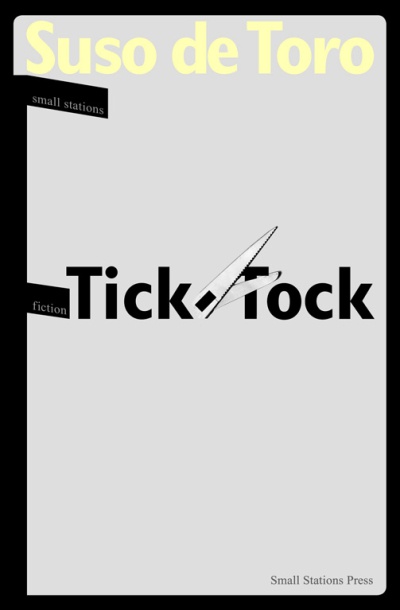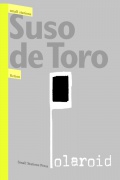De Toro, Suso

TICK-TOCK
by De Toro, Suso
‘Possibly the most impressive novel ever written in the Galician language’. With these words, the eminent critic Basilio Losada describes Suso de Toro’s novel Tick-Tock in a letter to the author. Suso de Toro is alternative in everything he does, he rearranges the boundaries, surprises the reader, does the unexpected, persons, tenses change, and what could be construed as an atheistic, chaotic novel acquires hints of religiosity. Nano, the narrator, is a man of uncertain age who has never made it in the world, but who likes to hold forth all the same, to fill notebooks with his thoughts on fishing in the Gran Sol, on controlling his libido, on inventing machines that serve no purpose. The novel centres on his experiences, and on the lives of those around him: his mother, his father and half-brother, the people who occupy the building where his mother cleans. Tick-Tock, a sequel to Polaroid, received the Spanish Critics’ Prize for its unconventionality and narrative expertise, and is the author’s most popular work.
Publication Date: 25 September 2016 / Language: English / Paperback: 278 pages / Dimensions: 203 x 133 mm / Price: Consult the catalogue
Amazon.com / Amazon.co.uk / Amazon.es / Barnes & Noble
Man, these books (Tick-Tock and Polaroid) are wild. Supposedly they’re connected (Tick-Tock is referred to as a “sequel” in the jacket copy), although I’m not sure that matters. Both share a particular style and structure, somewhere between a set of interconnected stories and a novel, and there are a few names that resurface in both books, but you could honestly read one without the other and be perfectly fine. Of the two, Tick-Tock definitely has more of a novelistic feel, with each of its five sections opening with a longer piece from Nano about his thoughts on life, history, aging, masturbation, etc., etc. Following those sort of framing pieces comes a series of much shorter anecdotes, mini-stories, musings from a philosopher’s many books (like On Getting Through Life, or Concerto for the Left Hand), little language games (like a section called “Aaah” that’s mostly onomatopoeia), or jokes (like the one about the Englishman, Dutchman, and Galician who argue about who has the biggest head). These are really anarchic books, vacillating wildly from more violent, disturbed pieces (like the one in Polaroid about the blind man who beats his wife with his walking stick until she decides to poison him and his dog) to funny, voice-driven sections […] The Physics of Sorrow by Georgi Gospodinov kept coming to mind as I read these. There’s a loose similarity in the way the books are structured, and there are even a few minotaur stories in Polaroid. So if you like Gospodinov’s novel, you might want to check these out.

